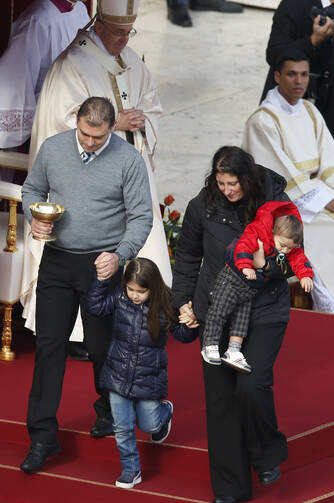In being a minister of God's mercy and a guide on the path to holiness, the Catholic Church must develop better ways to "accompany" people in their family life and not simply condemn those who fail, said a diverse group of theologians, including the former theologian of the papal household.
Cardinal Georges Cottier, who served as the papal theologian from 1989 to 2005, said, "In rigorism, there is an innate brutality that is contrary to the delicacy with which God guides each person."
La Civilta Cattolica, a Jesuit journal reviewed at the Vatican prior to publication, published an interview July 30 with Cardinal Cottier about mercy and the upcoming Synod of Bishops on the family.
The cardinal said he was certain that the Year of Mercy proclaimed by Pope Francis would influence the synod's work, which has the task of proclaiming God's plan for the human family and assisting all Catholics—including those in what the church would define as "irregular" situations—to grow in holiness.
"Some people have been scandalized by the church because of a negative judgment issued in an impersonal and soulless way," Cardinal Cottier said. "They have felt driven away, rejected in a serious manner."
While the church's ministers must uphold church teaching, he said, "this must be presented and explained in a language that clearly transmits the maternal concern of the church."
"Through the voice of its pastors," Cardinal Cottier said, "the church always must demonstrate that it is guided by the requirements of divine mercy."
Also in late July, the German bishops' conference posted on its website translations of papers from a theological study day May 25, sponsored by the presidents of the bishops' conferences of Germany, France and Switzerland. In preparation for the synod Oct. 4-25, the bishops said they wanted to hear the reflections of theologians, biblical scholars and canon lawyers. Some writers, who were not invited to the meeting and were critical of the position of some of the participants, dubbed it a "shadow synod."
Most of the speakers insisted that while the church's doctrine and canon law must speak in general terms, the pastoral applications of its teaching on marriage and family life must take into account the history and situation of the individuals involved and offer them guidance and assistance in growing in holiness.
Anne-Marie Pelletier, a theologian from Paris, told the bishops that the Gospel makes clear that Jesus saw the indissolubility of marriage as what God wanted for man and woman; the first account of creation in the Book of Genesis, she said, even implies that the bond is "that which renders humanity in 'the image of God.'"
However, she said, the church must find a way to offer healing and resurrection to those who, "after a failure or abandonment, make a commitment—for reasons inseparable from their personal stories, which are always unique—to a second union."
Father Francois-Xavier Amherdt, a theologian in Fribourg, Switzerland, spoke to the bishops about sexuality as an expression of love. He insisted on the importance of "refusing every discrimination against people who recognize themselves as homosexual," but he also said the church must make "an affirmation of non-equivalence" between heterosexuality and homosexuality.
In Genesis, Adam was able to say of Eve, "This one, at last, is bone of my bones and flesh of my flesh," because she was "not a copy, but what he was missing," Father Amherdt said. The male-female difference is important, he said.
In situations where couples are not living the ideal of Catholic marriage, he said, the church's pastoral practice must reflect "a theology of grace," which recognizes what good does exist in their love for another and tries to build on that.
Jesuit Father Alain Thomasset, who teaches in Paris, told the bishops that a church approach focused more on recognizing "intrinsically evil" acts, rather than on promoting spiritual growth, is bound to fail today. It begins by "condemning artificial contraception, the sexual acts of the divorced and (civilly) remarried and of homosexual couples, even those who are stable" in their commitment to one another.
Pastoral accompaniment, he said, is motivated by a belief that "the God of Jesus Christ is a God of love, who does not want death but life and happiness and who calls each person to progress on a journey of growth and holiness."
Forgiveness and mercy are essential to the progress, he said, and could be extended in certain circumstances to some divorced and civilly remarried Catholics and to some Catholic homosexuals who are in faithful, stable relationships.
A summary of the discussions at the May meeting said reconciliation is "a fundamental dimension of the Christian message. In this context, it was said that a process of reconciliation for all men and women in every situation cannot be renounced."
"The fact that for the divorced and remarried, who are sexually active in their second relationship, there is no possibility of reconciliation constitutes a dead end," it said. "In religious practice there is no parallel for this refusal."








